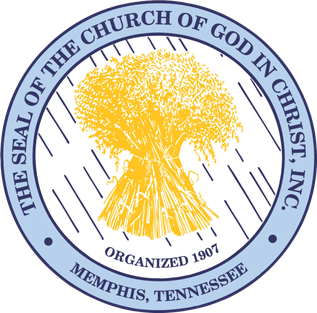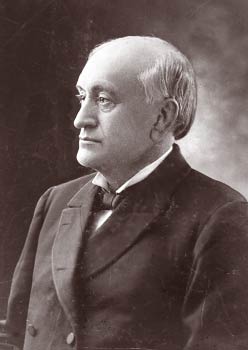Related Research Articles

The Church of God in Christ (COGIC) is an international Holiness–Pentecostal Christian denomination, and the largest Pentecostal denomination in the United States. Although an international and multi-ethnic religious organization, it has a predominantly African American membership based within the United States. The international headquarters is in Memphis, Tennessee. The current Presiding Bishop is Bishop John Drew Sheard Sr., who is the Senior Pastor of the Greater Emmanuel Institutional Church of God in Christ of Detroit, Michigan. He was elected as the denomination's leader on March 27, 2021.

The Church of the Nazarene is a Christian denomination that emerged in North America from the 19th-century Wesleyan-Holiness movement within Methodism. It is headquartered in Lenexa, Kansas. With its members commonly referred to as Nazarenes, it is the largest denomination in the world aligned with the Wesleyan-Holiness movement and is a member of the World Methodist Council.
Religion in Trinidad and Tobago, which is a multi-religious country, is classifiable as follows:
Nazarene Theological Seminary (NTS) is a Nazarene seminary in Kansas City, Missouri. The seminary was established by the Eleventh General Assembly in June 1944 and started its first school year in 1945 with 61 students. It moved to its current location in 1950. The seminary offers master's degrees in Divinity, Christian Education, Intercultural Studies, and Theological Studies as well as a Doctor of Ministry degree (D.Min.) and non-degree programs.
Pilgrim Holiness Church (PHC) or International Apostolic Holiness Church (IAHC) is a Christian denomination associated with the holiness movement that split from the Methodist Episcopal Church through the efforts of Martin Wells Knapp in 1897. It was first organized in Cincinnati, Ohio, as the International Holiness Union and Prayer League (IHU/IAHC). Knapp, founder of the IAHC, ordained and his Worldwide Missions Board sent Charles and Lettie Cowman who had attended God's Bible School to Japan in December 1900. By the International Apostolic Holiness Churches Foreign Missionary Board and the co-board of the Revivalist the Cowmans had been appointed the General Superintendents and the Kilbournes the vice-General Superintendent for Korea, Japan and China December 29, 1905. The organization later became the Pilgrim Holiness Church in 1922, the majority of which merged with the Wesleyan Methodists in 1968 to form the Wesleyan Church.

Phineas F. Bresee was the primary founder of the Church of the Nazarene, and founding president of Point Loma Nazarene University.
Pentecostalism has grown in India since its introduction in the early twentieth century. Several Pentecostal missionaries who had participated in the Azusa Street Revival visited Kerala from 1909 onwards. During the 1920s the missionary Robert F. Cook established the Indian branch of the Church of God, based in Kerala. In 1922 Assemblies of GOD church was established in Melpuram which was part of then Travancore state by missionaries. It has been one of the early pioneering churches in the region. Two other churches founded around this time were Ceylon Pentecostal Mission (CPM) later became The Pentecostal Mission, in the 1980s, founded in Sri Lanka by the Indian evangelist Pastor Paul, and later brought to India; and the Indian Pentecostal Church of God, set up by K.E. Abraham after he split from the church founded by Cook. A later foundation, in 1953, was the Sharon Fellowship, which runs the Sharon Women's Bible College.
Edward G. Lawlor (1907-1987), born in England into a Roman Catholic family and raised in Canada, was a minister for most of his adult life in the Church of the Nazarene.
Donald Dean Owens is an American general superintendent emeritus in the Church of the Nazarene, and also a retired ordained minister, missionary, professor, and seminary and college president. Owens is the founding president of the forerunner of Korea Nazarene University, and Asia-Pacific Nazarene Theological Seminary in Taytay, Rizal, Philippines (1983–1984), and served as the pioneer missionary for the Church of the Nazarene in the Republic of Korea (1954–1966), and as a missionary for four years in the Philippines (1981–1985), where he was the first Regional Director of both the Asia Region (1981–1985) and the South Pacific Region (1981–1983) of the Church of the Nazarene. Owens was the 2nd President of MidAmerica Nazarene College in Olathe, Kansas, for 4 years from 1985. In June 1989 Owens was elected the 28th General Superintendent of the Church of the Nazarene, and after being re-elected in 1993, served until his retirement in June 1997.

Asia-Pacific Nazarene Theological Seminary (APNTS) is a graduate-level theological institution located near Metro Manila in the Philippines. APNTS is a seminary in the Wesleyan theological tradition and affiliated with the Church of the Nazarene through its Division of World Mission. Its mission is to prepare "men and women for Christ-like leadership and excellence in ministries." Its institutional vision is: "Bridging cultures for Christ, APNTS equips each new generation of leaders to disseminate the gospel of Jesus Christ throughout Asia, the Pacific, and the world.

The Assemblies of God USA (AG), officially The General Council of the Assemblies of God, is a Pentecostal Christian denomination in the United States and the U.S. branch of the World Assemblies of God Fellowship, the world's largest Pentecostal body. The AG reported 2.9 million adherents in 2022. In 2011, it was the ninth largest Christian denomination and the second largest Pentecostal denomination in the United States. The Assemblies of God is a Finished Work denomination, and it holds to a conservative, evangelical and classical Arminian theology as expressed in the Statement of Fundamental Truths and position papers, which emphasize such core Pentecostal doctrines as the baptism in the Holy Spirit, speaking in tongues, divine healing and the Second Coming of Jesus Christ.
The Georgia Nazarene District is the umbrella organization of Church of the Nazarene congregations in the U.S. state of Georgia. It was officially created in 1915. It currently oversees 102 Nazarene Churches and a Nazarene campground located in the small town of Adrian.

Ambrose University is a private Christian liberal arts university located in Calgary, Alberta, Canada.

Eugenio Duarte is an ordained minister and 37th General Superintendent in the Church of the Nazarene. Born in Cape Verde, Duarte was the first African elected to the General Superintendency in the Church of the Nazarene. His election occurred in the centenary year of the denomination. Duarte was elected June 30, 2009 at the 27th General Assembly of the Church of the Nazarene.
Stan A. Toler was a minister and general superintendent emeritus in the Church of the Nazarene. He was also an author having written 100 books, many of them published through the Nazarene Publishing House. He served as a Pastor in Ohio, Florida, Tennessee and Oklahoma.
The history of the Church of the Nazarene has been divided into seven overlapping periods by the staff of the Nazarene archives in Lenexa, Kansas: (1) Parent Denominations (1887–1907); (2) Consolidation (1896–1915); (3) Search for Solid Foundations (1911–1928); (4) Persistence Amid Adversity (1928–1945); (5) Mid-Century Crusade for Souls (1945–1960); (6) Toward the Post-War Evangelical Mainstream (1960–1980); and (7) Internationalization (1976-2003).
Susan Norris Fitkin was a Canadian ordained minister, who served successively in the Society of Friends, the Association of Pentecostal Churches of America, and finally in the Church of the Nazarene. Fitkin was the founder and first president of the Church of the Nazarene's Women's Foreign Missionary Society from September 1915 until her retirement in June 1948. Fitkin served twenty-four years on the General Board of the Church of the Nazarene. In 1924 Fitkin and her husband Abram Fitkin funded and founded the Fitkin Memorial Hospital in Manzini, Swaziland, and also funded and founded Nazarene Bible Training Schools in China, and Beirut, Lebanon.
The Baháʼí Faith in Trinidad and Tobago begins with a mention by ʻAbdu'l-Bahá, then head of the religion, in 1916 as the Caribbean was among the places Baháʼís should take the religion to. The first Baháʼí to visit came in 1927 while pioneers arrived by 1956 and the first Baháʼí Local Spiritual Assembly was elected in 1957 In 1971 the first Baháʼí National Spiritual Assembly was elected. A count of the community then noted 27 assemblies with Baháʼís living in 77 locations. Since then Baháʼís have participated in several projects for the benefit of the wider community and between 2005 and 2010 various sources report near 1.2% of the country, about 10,000–16,000 citizens, are Baháʼís.
Carla D. Sunberg is an American ordained minister in the Church of the Nazarene, administrator, academic, author, speaker and former missionary and registered nurse, who is the 2nd woman elected as a General Superintendent in the Church of the Nazarene, and was the first woman and the 10th person elected as president of Nazarene Theological Seminary. At the time of her election on January 3, 2014, Sunberg was co-District Superintendent of the East Ohio District of the Church of the Nazarene, having served in this role since November 1, 2011. Dr Sunberg was elected the 43rd General Superintendent in the Church of the Nazarene on the 11th ballot by the delegates of the 29th General Assembly of the Church of the Nazarene on June 27, 2017. Sunberg is the only daughter of Jerald Johnson, the 24th General Superintendent of the Church of the Nazarene.
References
- ↑ Newsday, Trinidad and Tobago (2008). "Local Nazarenes join in global Centennial Celebrations". Daily News Limited.
- ↑ "Gelien Matthews". sta.uwi.edu. Archived from the original on 2016-02-23. Retrieved 2024-06-17.
- ↑ Matthews, G. (2008). History of the Church of the Nazarene in Trinidad and Tobago. Trinidad:Church of the Nazarene Trinidad and Tobago District. ISBN 9789768223050.
- ↑ Annual Assembly Journal of the Church of the Nazarene Trinidad and Tobago District 2013
- ↑ "Área Ingles de la Región, inicia en "Catch The Fire of the Holy Spirit" nuevos sueños de crecimiento". February 22, 2013.
- ↑ Saxon, Ruth (2002). Triumph in Trinidad-God's Promises never failed. Nazarene Publishing House. ISBN 9780834119635.
- ↑ Annual Assembly Journal of the Church of the Nazarene Trinidad and Tobago District 1956 - 2012
- ↑ "Victor Everton George". Archived from the original on 2013-07-04. Retrieved 2013-04-29.